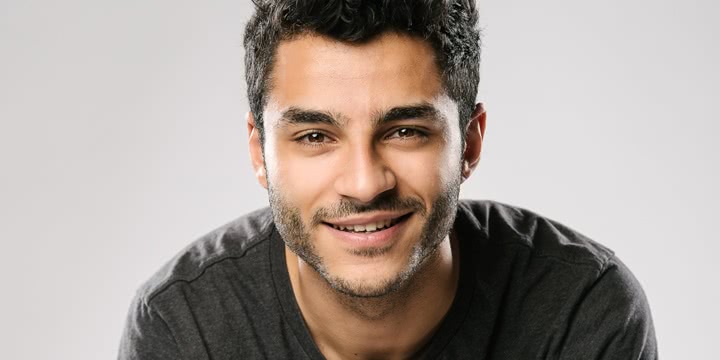Khaled Khalafalla is a lot of things: he’s a stand-up comic, an actor and an award-winning cultural commentator.
He is also, by his own admission, most resoundingly not a morning person, and the pre-9am timeslot selected for his interview with the BRAG means he has to wake up earlier than he might normally. Even more unfortunately, it’s the second time in the space of a week that his sleep schedule has been disrupted by bloody media types.
“I was in Adelaide yesterday, and I was staying with Amos Gill, another comic,” Khalafalla says, chirpy despite the hour of the call. “He’s one of the breakfast hosts on the radio. And because he does breakfasts, he’s always waking up at 4am and doing the shift till eight. So, because I was staying at his house I had this thought where I was like, ‘Ah fuck, I better wake up when he wakes up.’ It was Saturday and I was like, ‘If he wakes up at four usually, his sleep-in will be early – six or seven.’
“So I kept waking up periodically, checking to see if he was awake too. I had this horrible sleep from six till like nine. And then finally he woke up at like midday. I was like, ‘Dude! I thought you’d be up at six?’” Khalafalla laughs. “But he says he has this amazing ability to force his body to sleep. He just resists waking up. You’ve just got to fool your body into not waking up – it’s like a hack.”
Even though Khalafalla might not feel 100 per cent early in the morning, he certainly talks like a man very much awake. It doesn’t take long before the comic is keenly examining his own craft, reflecting on the bizarre contrast between the hours comedians have to put into their work and the finished product, a fluid, seemingly casual work of art.
“What does it look like to work hard writing jokes?” Khalafalla asks. “It’s a paradox. What does it look like working hard at something that is fun? It’s the old adage that you can’t be creative with a gun held to your head. But that’s exactly what comedy is.”
A lot of Khalafalla’s comedy relies on a very specific persona, one he has written and honed over the years – the fact his new show is titled Jerk may well give newcomers to his craft an insight into the belligerent nature of his onstage character. And yet Khalafalla argues that performing in this way fulfils a desire more primal than creative.
“Sometimes I wonder whether it’s a basic human social need to mimic,” he says. “Or just to pretend. Comics are hyper-aware of the characters that they play every day. That doesn’t mean that they’re the only people who do it. Everyone does it, they just don’t realise it when they do it. Like, when someone goes to work, they’re a different person in the office than they are when they are at home.”
The wearing of such a mask requires constant adjustment, something that Khalafalla makes look seamless. “As I get better, a lot of the audience members can’t tell, but I feel that every time I get up onstage, I’m a different person,” he says. “Sometimes I’ll be like, ‘I’ll try this, maybe that will make me more comfortable?’ Or like, ‘No, I’ll try this.’ It’s about constantly readjusting your butt on a seat.”
He laughs again. “Everyone’s looking at this seat I’m sitting on like, ‘Wow, that looks really comfortable.’ But when nobody’s looking I’m just constantly reshuffling one butt cheek to another.”
Khaled Khalafalla appears atThe Comedy Store on Saturday November 26.


































